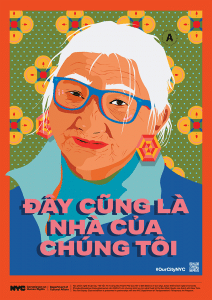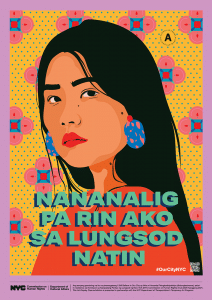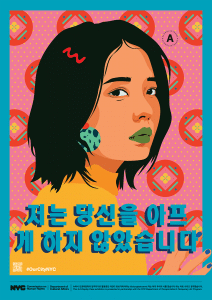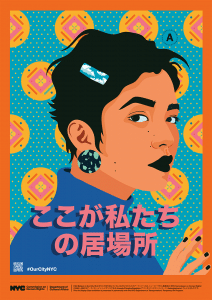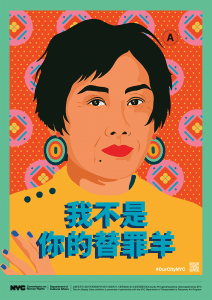We published a blog post last April within a two-part series on how racism alongside COVID-19 impacted two communities. Nearly a year later, we face persisting anti-Asian racism and violence. We have updated our reflections on recent incidents and new data, but the urgency of speaking up and showing solidarity has remained the same.
As of YESTERDAY, we know that:
- A white 21-year-old gunman murdered eight people at Asian-owned spas and massage parlors in the Atlanta area on March 16. The suspect claimed his motivations were unrelated to racism, but rather a result of his “sexual addiction.” Across the US, Asian women reported more than ⅔ of over 3,800 anti-Asian racist incidents in the past year.
Contrary to claims from the assailant above, we can’t disentangle the intersectional sexual violence perpetrated against women in the Asian community. It’s not new. It’s an Old Normal embedded in American society, from the Page Act of 1875 characterizing “immoral” Chinese women, to the US military violence during the Vietnam War (including the My Lai Massacre), as well as more recently in Okinawa and Olongapo. Fetishized stereotypes of docile, submissive Asian women are reinforced in endless American pop culture references, including Full Metal Jacket and Madame Butterfly. We are reckoning with centuries-old dehumanization, where a man born in the 21st Century has a “really bad day” and feels emboldened to harm vulnerable working-class women.
As a Korean-American woman, born in Philadelphia yet often complimented on my English proficiency, the recent attacks resemble what I and other women have experienced. This past fall I was punched after getting off the subway in Manhattan. I questioned whether I was targeted for my identity as an Asian woman. Looking back, he appeared to make a deliberate choice to assault me, while ignoring other men and non-Asian women on the platform.
Executive Director Sonia C. Park shares her personal experience
In addition to Asian women in low-wage jobs, victims of more recent violent racism have included our elderly community members. Misinformation, fear, and xenophobia have contributed to attacks targeting Asian Americans, from those on the national stage to those at grocery stores
- An 84-year-old man of Thai descent died in late January after being attacked on his morning walk in San Francisco. Days later, a 91-year-old Asian man was violently shoved to the ground in Oakland’s Chinatown.
- In February, a 64-year-old woman was robbed outside a Vietnamese market in San Jose, CA and a 61-year-old Filipino man was slashed in the face last week on the New York City subway.
While we offer support to our members, their communities, and one other, how do we recognize what Asian communities have experienced? How do we transform our society beyond its white supremacist systems of violence?
Although these events have been devastating, I am inspired by educators in our coalition who work through challenging emotions of grief and rage, while challenging us to envision how restorative justice can repair harm in a school community. Similarly, I am heartened by cross-racial communities implementing this mindset of collective care, through grassroots mutual aid campaigns, solidarity rallies, civilian volunteer-led escorts for fearful elders on neighborhood outings. We embrace solutions that liberate all of us, without relying on the false promise of safety under criminalization and surveillance.
Above all, I feel moved when I reflect on one of our Core Values: Community. We accomplish more when we build trusting, collaborative, and honest relationships with one another. In that light, I invite you all to join me in making our communities stronger.
Despite the fear, anxiety and grief that surround us, we will continue to be there for each person, school and community. We stand against hate.
—Amy, Sonia, Seon, Ashley, Dave
Lead:
- Leading an Equity-Focused Response Through and Beyond COVID-19: The NYC Leadership Academy has created a guide to support principals and school system leaders in leading an equity-focused response to the ripple effect of COVID-19.
Listen:
- How Some Teachers Are Shining a Light on the Xenophobic Tone of COVID19: A podcast by Rosa Isiah with Dr. Tommy Chang. They explore how passive ignorance and intentional mislabeling of COVID-19 harm some Americans. And what some educators are doing to try to shine a light on this problem.
- Dragon Kids is an award winning student podcast. They teach you Mandarin words pertaining to the Coronavirus and talk about the harassment Asian students are receiving regarding COVID-19. The Dragon Kids are in 6th grade and were all once English language learners.
- KQED Forum. Brutal Attacks Against Bay Area Asian Americans Spur Calls for Action Statewide talks about how anti-Asian violence is affecting individuals and communities and what can be done to stop it.
- Trevor Noah and Ronny Chieng explains how you can help stop this wave of violence on the Daily Show.
- Katie Yue-Sum Li 李宇心, an instructional coach in Boston Public Schools, created a video adaptation of A Kid’s Book about Racism, entitled What does racism have to do with me? Asian American kids get talking.
.
Respond:
- How to Respond to Coronavirus Racism: As COVID-19 infections increase, so does racism and xenophobia. The “Speak Up” strategies give you tools to let people know you’re not OK with racist or xenophobic comments about coronavirus or anything else.
- Bystander’s Guide to Intervention: Take care of all communities during this pandemic and learn how to intervene when you see harassment.
- Stop bullying: From the US Department of Health and Human Services, resources to teach students how to identify bullying and how to stand up to it safely.
Represent:
- Books and resources for teachers that include multiple perspectives and cultures
- Asian American Policy Review: Founded in 1989, it’s the first nonpartisan academic journal in the country dedicated to analyzing public policy issues facing the Asian American and Pacific Islander (AAPI) community.
Report and Educate:
- Anti-Asian Violence Resources
- Nationally, if you’ve experienced a hate incident report it to Asian Americans Advancing Justice and Stop AAPI Hate.
- Massachusetts: AAC’s Community Action Guide, created the Community Action Guide to help the community respond to the rise in hate incidents against the AAPI community.
- NYC toolkit: Asian New Yorkers: You have the right to be free from harassment and discrimination under the New York City Human Rights Law. Report it here: http://nyc.gov/reportdiscrimination
Multiple language graphics:
- Text for social media posts and graphics available in Traditional Chinese, Korean, Japanese, Tagalog, and Vietnamese here.
